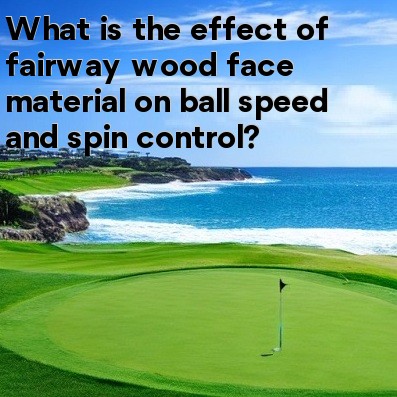
When it comes to fairway woods in golf, the face material plays a crucial role in determining ball speed and spin control. The material used in the face of a fairway wood can greatly affect how the ball reacts upon impact, ultimately influencing the distance and trajectory of the shot.
1. Titanium Face:
- A fairway wood with a titanium face tends to offer increased ball speed off the clubface.
- Titanium is a lightweight and durable material that allows for a larger sweet spot on the face, resulting in improved forgiveness and higher ball speeds across a wider range of impact points.
- The use of titanium in the face construction promotes greater energy transfer from the clubhead to the ball, generating more distance and a powerful launch.
- However, titanium faces may have slightly less spin control compared to other materials.
2. Steel Face:
- Fairway woods with steel faces tend to provide excellent spin control.
- Steel offers a more solid feel at impact, allowing skilled players to manipulate the ball flight and shape shots with better control.
- The lower ball speeds generated by a steel face can be compensated for by generating more spin, resulting in increased stopping power on the greens.
- Steel faces are often favored by players who prioritize shot shaping and precision over pure distance.
3. Composite Face:
- Some modern fairway woods feature a composite face, which combines different materials to optimize performance.
- Composite faces can offer a balance between ball speed and spin control, providing the best of both worlds.
- By strategically placing different materials, manufacturers can enhance the properties of the face to provide maximum distance and optimal spin rates.
- Composite faces also allow for weight adjustment, enabling better clubhead optimization for individual player preferences.
Conclusion:
The choice of fairway wood face material depends on a golfer's playing style, skill level, and personal preferences. Titanium faces are known for their ability to generate high ball speeds and maximize distance. Steel faces, on the other hand, emphasize spin control and shot shaping. Composite faces offer a combination of both speed and control, providing a versatile option for players of various skill levels.
Ultimately, selecting the right fairway wood face material comes down to finding the right balance between distance and precision. Players who prioritize distance may opt for titanium faces, while those seeking increased control may lean towards steel faces. Golfers who desire a versatile club that offers a bit of both can explore fairway woods with composite faces.
It's important for golfers to test different fairway wood options and evaluate how each face material affects their ball speed and spin control. By finding the ideal face material for their game, golfers can optimize their performance and achieve better results on the course.





